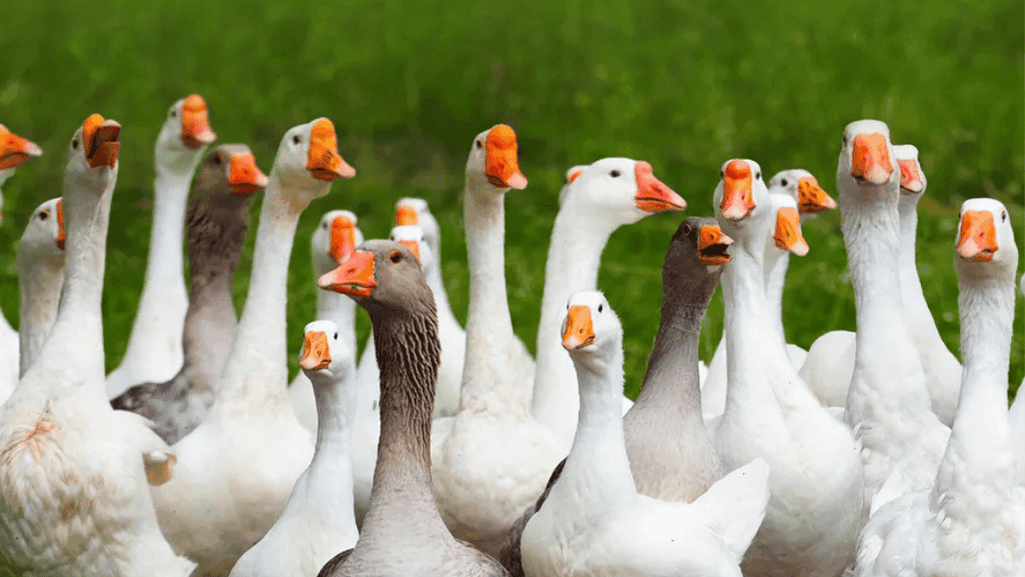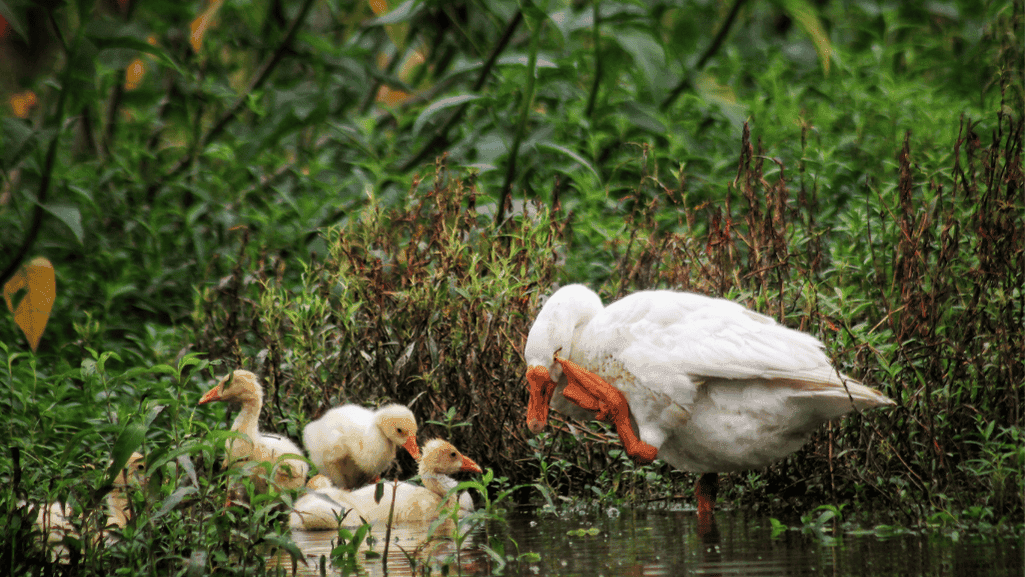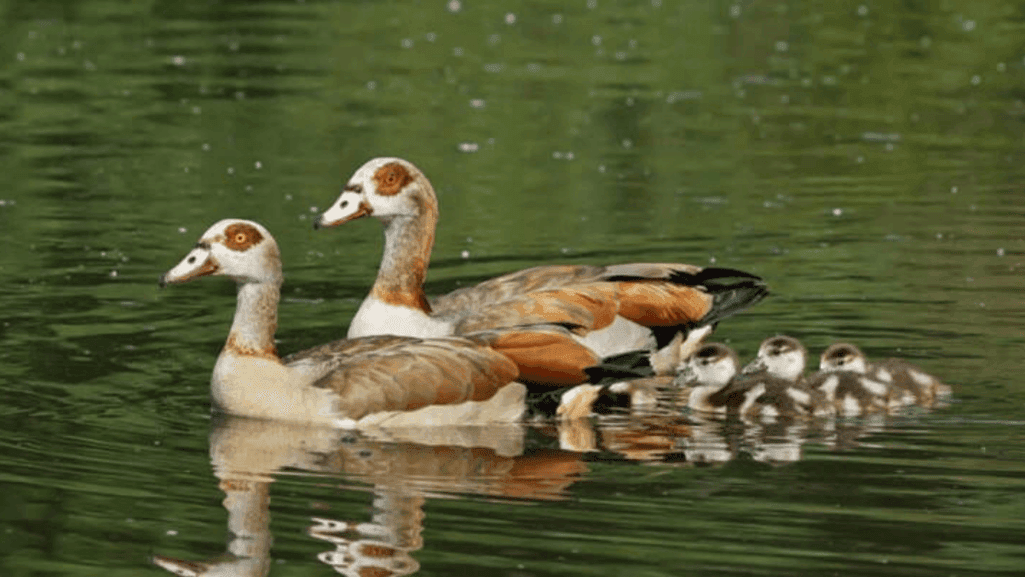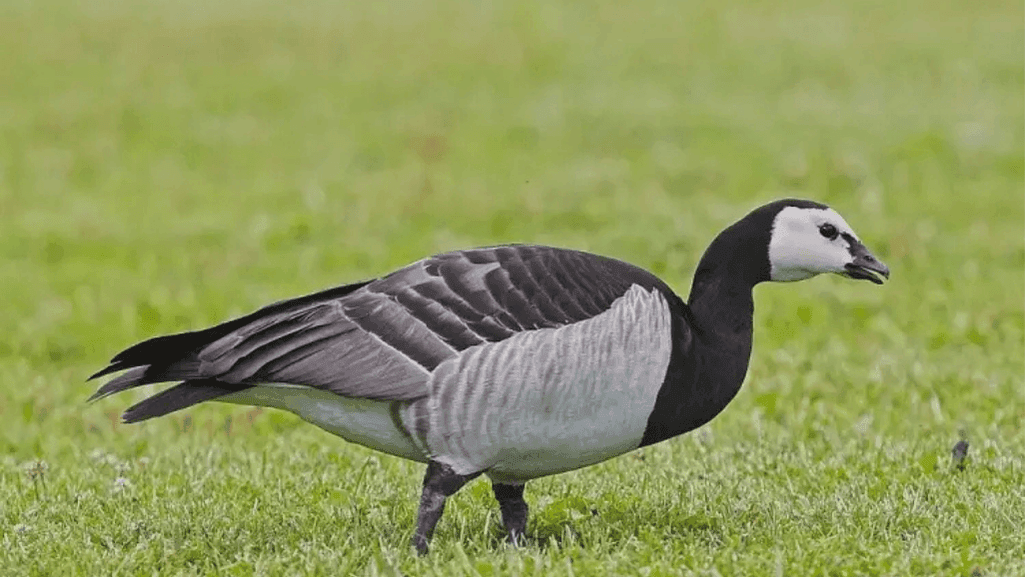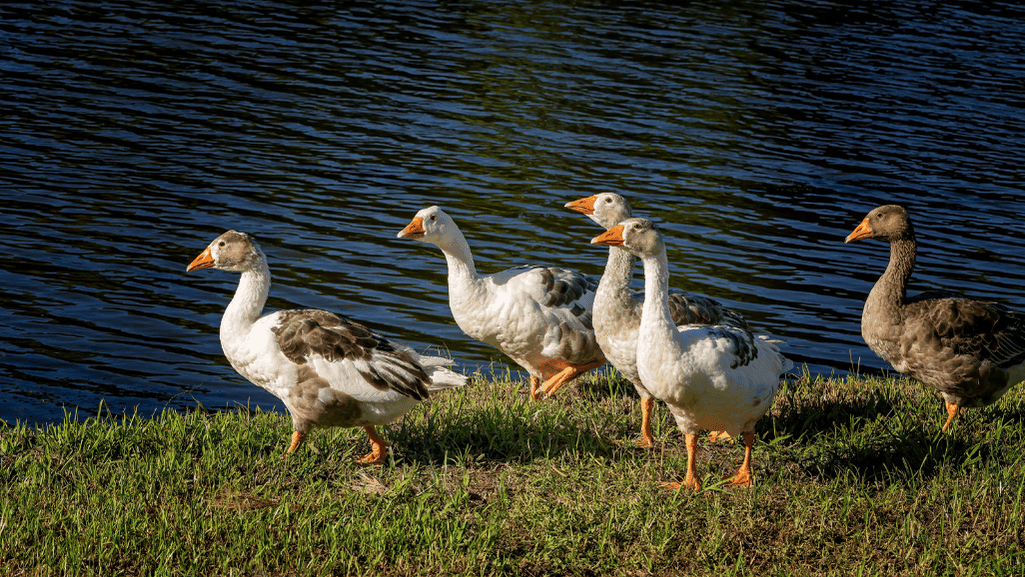Geese are majestic waterfowl known for their long lives. Their lifespan varies based on species, living conditions, and diet. Learning about the average goose lifespan helps us understand their life cycles and challenges in both wild and domestic settings. It shows how resilient and adaptable these birds are.
The average lifespan of a goose is 15 to 25 years. Some geese can live over 40 years. For example, Canadian Geese live about 12 years, while Toulouse geese can reach 21 years.
Wild geese live shorter lives than domestic ones. They usually live 10-20 years, with 15 years being common. Domestic geese, on the other hand, can live 15-25 years, with some reaching 20 years.
Nutrition is key to a goose’s lifespan. Wild geese eat plants, while domestic ones get grass, straw, and pellets. Giving domestic geese a ¼ acre of grass, fresh water, a shelter, and protection from predators helps them live longer. Regular vet visits are also important for their health and longevity.
Geese go through five life stages: egg, hatchling, gosling, sexual maturity, and adulthood. Their feathers and markings can show their age. Females are more at risk during mating season due to nesting. The oldest wild Canada Goose lived 33 years, while a captive one lived over 40 years. Yet, most wild Canada Geese live about 20 years, with many dying in their first year.
Key Takeaways
- Goose lifespans range from 15-25 years on average, with some living over 40 years.
- Wild geese have shorter lifespans compared to domestic geese.
- Nutrition and living conditions significantly impact goose lifespan.
- Geese go through five life stages: egg, hatchling, gosling, sexual maturity, and adulthood.
- The oldest wild Canada Goose lived to be at least 33 years old, while a captive goose reached over 40 years.
Understanding Goose Lifespan
Geese lifespan varies based on several factors. Wild geese usually live between 10 to 20 years. The exact age depends on the species.
The barnacle goose, for example, can live up to 25 years in the wild. It’s medium-sized, measuring 20 to 28 inches long. The brant goose, being smaller, has a shorter lifespan.
Natural Lifespan vs. Domestication
Domestic geese live longer than wild ones. They can live up to 15 to 20 years. This is due to better care, food, and water.
Domestic geese lifespan also depends on breed and living conditions. Some can live up to 30 years with the right care.
Factors Affecting Lifespan
Several factors influence goose lifespan. The species is a big factor. Larger geese, like Canada geese, live longer than smaller ones.
Environment also plays a role. Wild geese face dangers like predators and harsh weather. Domestic geese are safer, which helps them live longer.
Nutrition and healthcare are key. A balanced diet and regular vet visits help geese stay healthy. This can extend their lifespan.
Common Goose Species
When we talk about goose lifespans, it’s key to look at different species. Their lifespans can vary a lot. The goose lifecycle changes based on if they’re domestic or wild. Each faces its own challenges that affect how long they live.
Domestic Geese
Domestic geese, like African, Buff, and Chinese, live 12 to 20 years. They’re raised in controlled settings, which helps them live longer than wild geese. Good food, vet care, and safety from predators are key to their long lives.
Wild Geese
Wild geese, including Canada and Pink-footed, live 6 to 30 years. They face many dangers like predators, disease, and harsh weather. These challenges can shorten their lives.
“Throughout the 20th century, the Canada goose population faced a decline due to overhunting and habitat loss, leading to conservation efforts to restore their numbers.”
Differences in Lifespan
Domestic and wild geese live different lengths of time for many reasons. Domestic geese have a stable home, regular food, and vet care. Wild geese, on the other hand, must deal with predators, finding food, and harsh weather. These factors can affect their goose old age.
Average Lifespan of Common Geese
Geese can live quite a long time, but it depends on the species and where they live. On average, they can live between 10 and 25 years. Some geese even live longer than that.
Lifespan of Domestic Geese
Domestic geese usually live longer than wild ones. They can live between 10 and 20 years. Some breeds, like the Embden and Chinese, can live up to 25 years. The oldest goose, named George, lived an amazing 49 years and 8 months.
Lifespan of Wild Geese
Wild geese typically live for 10 to 20 years. But, some can live up to 30 years or more. The oldest wild Canada goose lived to be at least 33 years and 3 months old.
Lifespan Variations by Species
Not all geese live as long as others. For example, the Greater white-fronted goose lives only 6 to 10 years in the wild. Canada geese, on the other hand, can live up to 24 years.
Goslings have a survival rate of around 50% until fledging, and adult geese have a 70% year-on-year survival rate.
Knowing how long different geese species live helps us appreciate them more. It also shows us the challenges they face in the wild and in domestic settings.
Habitat Influence on Lifespan
The place where geese live greatly affects how long they live. Living in cities or countryside, facing dangers, or having enough food are key factors. These things greatly impact how long geese live when they get older.
In the wild, geese face many challenges that can shorten their lives. Animals like wolves, eagles, and foxes are always a threat. Studies show that wild geese usually live about 12 years, but some can live up to 30 years.
Urban vs. Rural Settings
Geese in cities or suburbs have smaller areas to roam. They live close to people and eat grass in parks and golf courses. While they might not face as many dangers, they deal with traffic, pollution, and people disturbing them, which can harm their health and lifespan.
Predation Risks
Predators are a big problem for geese in the wild. Baby geese are very vulnerable. But adult geese protect themselves and their young by staying in big groups. This way, they can find food and safe places to nest.
Availability of Food
Having enough to eat is very important for geese, even when they’re older. In the wild, they eat grasses and plants near water. But climate change and losing habitats can make it hard for older geese to find food. Domestic geese, on the other hand, get a steady diet from their owners. This helps them live longer, sometimes up to 80 years.
Health Factors Affecting Goose Lifespan
The health of geese greatly affects how long they live. Geese can live between 10 to 24 years. But, many things can change their lifespan, like where they live, what they eat, and aging signs. Knowing these factors and taking steps to prevent problems can help geese live longer and healthier.
Common Diseases
Geese can get sick in many ways, affecting their body systems. Some common diseases include:
- Duck Virus Enteritis (Duck Plague)
- Fowl Cholera
- Newcastle Disease
- Aspergillosis
- Avian Influenza
- Angel Wing (Carpal Valgus)
- Bumblefoot
- Frostbite
- Gout
To prevent these diseases, keep their environment clean and feed them well. Also, watch for signs of sickness. Regular vet visits can help catch and treat problems early.
Nutrition’s Role
Good food is key for geese to stay healthy and live long. They need a mix of proteins, carbs, fats, vitamins, and minerals. Eating too much or the wrong foods can cause problems like Angel Wing, which affects growing geese.
A healthy diet is the foundation for a long and vibrant life for geese.
Veterinary Care Importance
Seeing a vet regularly is important for geese. Vets can check their health, find and treat illnesses, and give advice on care. By working with a vet, owners can ensure their geese get the best care, helping them live longer.
Geese are strong, but they need careful care to do well. By knowing what affects their lifespan and taking steps to keep them healthy, we can help them live long, happy lives. For more on black and white geese, their traits, and how to protect them, check out our detailed guide.
The Impact of Climate on Goose Lifespan
Geese, like many waterfowl, adapt to different climates, including cold ones. Their thick coats and fat layers keep them warm in the Arctic and sub-Arctic tundra. Climate change affects their lifespan in complex ways, including how they adapt to weather and migrate.
Adaptability to Weather Changes
Many goose species, like the Canada goose, are made for cold weather. They can handle temperatures as low as -30°C (-22°F). Their special features help them survive, such as:
- Keeping their down undercoat as adults
- Oily feathers that stay waterproof
- Dense fat for insulation
Even with these abilities, climate change can harm geese. Warmer weather and changes in weather patterns can affect their food, breeding, and migration. This can shorten their lifespan.
Seasonal Migration Effects
Migration is key for many goose species. Some geese migrate to avoid cold winters and find breeding grounds. Migration is hard, with challenges like:
- Predation risks
- Extreme weather
- Little food
- Collisions with man-made things
But, successful migration can help geese live longer. For example, Canada geese can live 20-25 years. Some Ross’s geese have lived up to 22.5 years in the wild.
The Canada goose population has grown a lot thanks to conservation efforts.
In summary, geese are well-suited to different climates. But, climate change affects their lifespan in complex ways. Understanding these effects helps us see the challenges they face and how they live long lives in the wild.
Conservation and Lifespan
Protecting wild geese is key to their survival. We focus on saving their homes, controlling hunting, and watching their numbers. This helps them live longer and keeps ecosystems balanced.
Conservation Efforts for Wild Geese
Wildlife groups work hard to save wild geese and their homes. They do many things, like:
- Creating safe places for geese to live, breed, and migrate
- Working with local people to use land in a way that doesn’t harm geese habitats
- Teaching others why saving geese is important and how our actions affect them
These efforts help keep goose populations healthy. In the wild, geese can live from 10 to 24 years. Some even reach 30 years. By protecting their homes, we help them live their full lives.
Challenges Faced by Endangered Species
Even with good work, endangered geese face big challenges. These include:
- Being part of small groups that can get sick or struggle with changes easily
- Having less space to live because of human activities
- Being hunted illegally, which hurts their numbers even more
To tackle these issues, groups use different plans. They might breed geese in safe places, fix their homes, or stop poachers. This helps the geese survive and grow.
“The future of wild geese depends on our collective efforts to protect their habitats and ensure their long-term survival. Every action we take, no matter how small, can make a difference in the lives of these magnificent creatures.”
By helping conservation and spreading the word, we can help geese live longer. This way, they can keep thriving in the wild for many years.
Longevity Myths and Facts
There are many myths about how long geese live. Some say they can live for hundreds of years. But, these claims are not true and have no scientific backing.
Myths About Goose Lifespan
Many believe geese can live for centuries. The World Almanac even said they live up to 300 years. But, there’s no real evidence to support these claims.
Scientific Studies on Lifespan
Studies show geese don’t live nearly as long as myths say. The oldest goose lived to be 49 years and 8 months old. This is impressive but far from the exaggerated claims.
Things like species, habitat, and care can affect a goose’s life. Domestic geese, which are well cared for, live longer than wild ones. Knowing this helps us care for domestic geese better and protect wild ones.


